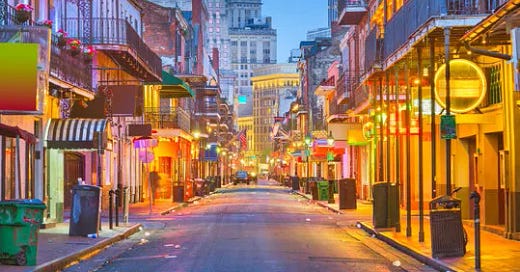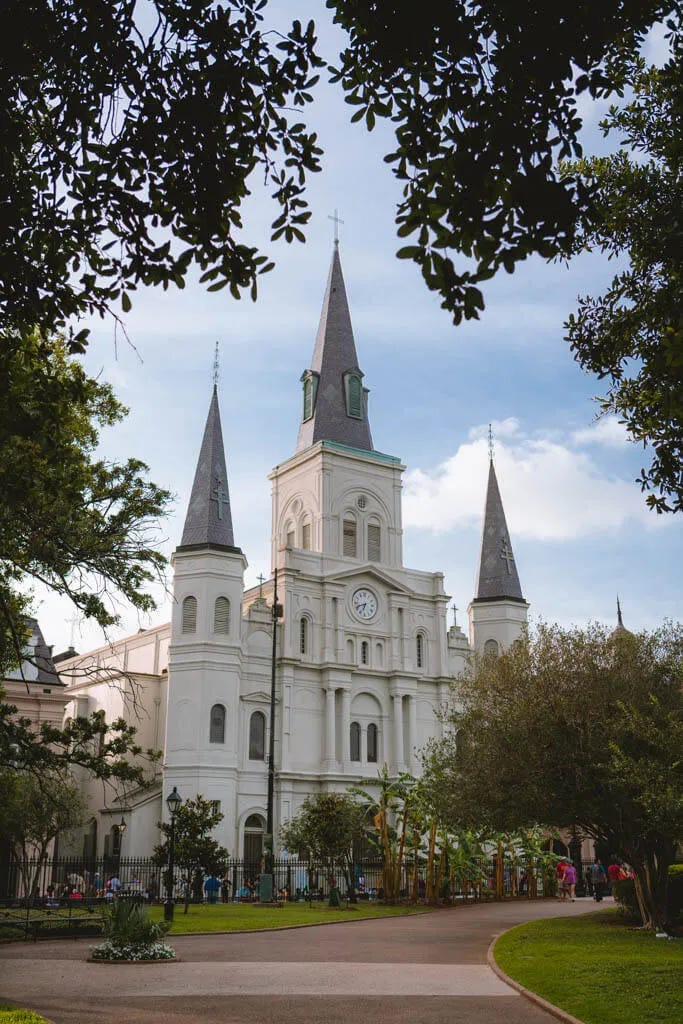New Orleans Has a Name
Jason: dad told me a story yesterday about a girl he knew in new orleans back in '84. She was screaming about slitting her wrists with a knife in her hand when the other guy she was fucking shows up at the place and dad and the guy get into a fistfight while the bitch is shrieking in the background. He says he almost threw him out a third story window but stopped.
Jason: the problem with new orleans is that there's not enough water
Jason: i love new orleans
New Orleans has an ancient imperial name. It comes from the Roman Emperors, and then from before the earliest histories of the written word.
New Orleans was founded in 1718, The Crescent City, past a bend in the Mississippi, past the “English Turn", on a most dismal swamp, by Jean-Baptiste Le Moyne, Sieur de Bienville, where the river flows West to East. The city sits at the rim of the Gulf Coast where the land pours into the sea. It is a city prone to hurricanes and floods and mosquitos; the delta sweeps away an acre of land every hour. But it was at the mouth of the Missippi, the Great American River, that Bienville planned to plant a major city. And New Orleans, the Queen of the South, was always intended to be a major city. The port of New Orleans would control all river trade coming out of the continent. This new city would surely secure the glories of Louisiana for France. Bienville named it for Philippe II, the Duke of Orleans, the regent of the Kingdom of France.
(New Orleans never actually became the city of the continent Bienville intended. The city that controls the most trade from the interior is New York, from the end of the Erie Canal, a story for another day.)
New Orleans is much younger than people think. New Orleans’ settlement in 1718 came long after New York City (1624), Albany (1614), Virginia (1607), Santa Fe (1610), St. Augustine (1565), Boston (1630), Quebec (1608), Charleston (1670), Pennsylvania (1682), and Detroit (1701). San Antonio, the first major city in Texas, was also founded in 1718, just a few days before New Orleans.
And New Orleans was not even at first the capital of Louisiana. That was Mobile, Alabama, founded in 1702 by Bienville and his brother Pierre de Moyne d’Iberville. New Orleans would not become the capital until 1723, five years after its settlement.
The built environment of New Orleans is even newer: the city was destroyed by two fires in 1788 and 1794 (simultaneous with George Washington's Presidency, the breakout of the French Revolution, and the establishment of Santa Cruz). The so-called French Quarter was actually built in the 1790s, after the fires, when New Orleans and Louisiana were run by the Spanish.
But New Orleans has an ancient name. Its namesake, Philippe II, Duc d’Orleans, came from the House of Orleans, a cadet branch of the House of Bourbon. The branch name came from the Duchy of Orleans, traditionally granted as an title to one of the French king's younger sons. That tradition began in 1344 when Philip VI granted the title "Orleans," along with the city, to a younger son (also named Philip).
And the city of Orleans was named for a Roman Emperor: Aurelian.
Aurelian is probably one of the greatest and most neglected emperors of Rome. He came to power in the middle of the Crisis of the Third Century, when degringolade and civil war had divided the empire and threatened to destroy it for good. He spent years campaigning and gathering strength and waging war to bring the empire together again. It was while Aurelian was on campaign in Gaul, 273-274 AD, trying to reabsorb the lost West, that he rebuilt the city of Orleans. 300 years prior it had been once been a great Gaullic city, Cenabum, a center of the realm, until it was destroyed by Julius Caesar. Caesar had razed Cenabum in 52 BC as part of his total conquest of Gaul. Aurelian had it rebuilt, and named the new city after himself: "Urbs Aurelianorum," or "Civitas Aurelianorum". In time "Aurelianorum" would shift into "Orleans".
The city of New Orleans is a kind of anti-America, and therefore ultra-America. The city has a deep history of foreigner heroes and adoptive sons. It is also one of the most distinctive blood-and-soil histories on the North American continent, a people set apart from everyone else. Bienville, who founded the city, came from Montreal, and before settling New Orleans first helped found the city of Mobile. The Creoles, as many of the first people of New Orleans came to be known, were those of European descent born away from Europe, into the fusion of the New World. "Creole" comes from the Spanish *criollo*, which was once used to describe *all* Spaniards born in the New World. In Spanish it probably comes from the Portugues *crioulo*, someone raised on one's house, from the Latin *creare*, to make or produce or beget. This in turn comes from the Proto-Indo-European \*ker-, which means "to grow".
The other people of New Orleans are the Cajuns. The terms Creoles and Cajuns have become conflated, and often no longer have any special distinction. But "Cajun" used to describe a very specific history. The Cajuns came from Acadia, the first French Colony in the New World, older than Quebec. This is today the Maritime Provinces of Nova Scotia and New Brunswick, and was originally French. The *Acadiens* who lived there fought intermittently with the colonists of New England, until the British redcoats conquered the whole province. Between 1755 and 1764 the British went about deporting all the French they could find (the word "genocide" had not yet been invented). About 12,000 Acadiens were deported by ship, and almost half of those died. Those who survived were passed from seaport to seaport, no English city wishing to take them. They ended up scattered across minor French possessions in the Caribbean, Saint-Domingue, and New Orleans. In New Orleans the word "Acadien" became "Cadien," which became "Cajun".
The word "Acadia" came from the Greek region "Arcadia," which had come in Europe to represent an idyll pastoral tranquil land. Verranzo probably gave the name Arcadia to much of the Atlantic coast in his explorations for the French in 1524. (The name is still preserved in Maine's Arcadia National Park.) "Arcadia" came from the Greek mythological hero *Ἀρκάς*, "Arcas," hunter, son of Zeus and the nymph Callisto. This probably comes from the proto-Hellenic \*árktos, from the Proto-Indo-European \*h₂ŕ̥tḱos, which both mean bear. (The Greek region of Arcadia possibly had bears.)
The name “Louisiana” comes from the King of France, Louis XIV, the “Sun King”. It was in the year 1682 that René-Robert Cavelier, known to history by his title “Sieur de La Salle,” left Quebec and traveled down the Mississippi to the Gulf coast. To claim these new lands for France, La Salle named them Louisiana for the King. The name “Louis” or “Lewis” comes from the old Frankish *Hlōdowik, which also gives us “Clovis,” the name of the first King of France. *Hlōdowik is a combination of the words *hlūdaz, “loud, famous,” and *wiganą, “to battle, to fight,” giving the name the meaning “famous farrior”. However some scholars suggest that the word comes from the root *hlutą, meaning “loot,” making Louis into “the warrior who brings loot”. This would, in either case, make Louisiana the land of warriors.
Andrew Jackson at the Battle of New Orleans, by E. Percy Moran
If New Orleans got its name from the Emperor Aurelian, from what did Aurelian himself get his name?
Born 214 AD, Aurelian was an Ilyrian, i.e., not a proper Roman. There are two major theories for how he got his name. One is that he was named to honor one "Aurelius". It is possible this was a senator and patron of his father. The other theory is that this name comes from the Edict of Caracalla, which gave all free men in the Roman Empire full citizenship in the year 212 AD. At this time many new Roman citizens adopted one of Caracalla, their new emancipator. His full name was Marcus Aurelius Antoninus, although he was born Lucius Septimius Bassianus.
Caracalla, the son of the usurper emperor Septimius Severus, adopted a new name to buttress his imperial claim. Septimius Severus came to power after the chaotic Year of the Five Emperors, which ensued after the overthrow of the tryant Commodus. The emperors before Commodus had been Marcus Aurelius and Antoninus Pius. Therefore, Caracalla was renamed Marcus Aurelius Antoninus.
Marcus Aurelius was the first emperor to bear the name "Aurelius". And as now become the running theme, "Aurelius" was not his birth name either. Marcus Aurelius was not born to the Imperial Throne, but was adopted into the family of Antoninus Pius in the Period of "The Five Good Emperors". The name "Aurelia" was a long-dormant Roman pedigree, one an ancient Roman plebian gens, one of the ancient Roman plebian familiy lines.
The Roman clan "Aurelius" probably was named from the Latin "aureus," a word meaning gold. (From the same word we get the abbreviation "Au" for Gold on the period table of Elements.) "Aurelius" would mean "the golden one" or "the gilded". It might have been a reference to blond hair. Or perhaps not. Another etymology suggests it descended from a Sabine word for "sun". (Would it not still mean "blond"? Or perhaps a deeper tradition naming the warriors who came out of the East...)
Finally, then, The Latin word "Aureus" comes from the Proto Indo-European *aus, meaning "to shine". From the same word we get these other words: Australia, Aurora, Austria, Easter, East. The association between *aus and East comes from the direction of the sun.
Therefore: the City of New Orleans was named to honor a French duke, from a long tradition of younger sons of kings; named for the city of Orleans, the city of Aurelian, the Roman emperor, who was named in honor of Romans before him, who bore a name out the gold of the sun of the east. New Orleans is the city of the New Kings, adoptive Kings, the Cajuns and Creoles, new peoples in a new world; Kings not made from birth who clawed their way to power and status; the new rising of the sun, the new dawn and the new golden day rising out of the east.








